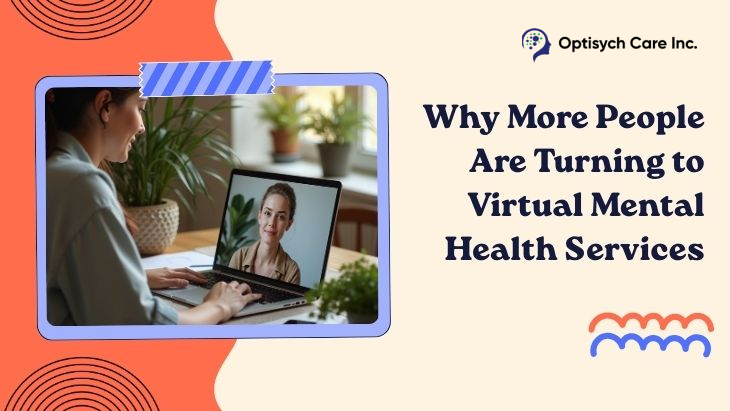Introduction:
Consider being in a meeting where people are so brilliant, but they are lost in terms of answers provided in jargon. The communication is lost, people lose motivation and are no longer interested, and the chance of inducing a reformation is lost. Communication is more than talking; it is being understood.
Research indicates that individuals who possess good levels of communication stand a 50 percent higher chance of being elevated to management positions. Clarity can be your secret weapon no matter if you are presenting a business presentation, explaining a concept to a class, or having a heart-to-heart with a loved one; clarity is the conduit between your mind and other people.
Within the article, we will delve into how clear words can result in brighter thoughts, the contribution that communication can make to mental health, and factors that you can utilize to nurture your abilities to speak better, all by taking cues through entities such as speech therapy, which exists as a field to help individuals unleash their speaking potential.
Insider Knowledge on the Relation between Mixed Words and Light Minds
The clear mind usually reflects in the clear words. The well-organized thoughts are available to be shared by us in such a manner that will be touching and motivating. That is why the key role in perfecting communication skills is emphasized by numerous leaders, educators, and therapists.
Cognitively, active communication obliges us to manipulate messages and indicates to us the need to process, rank, and jot down our thoughts. This enhances not only the power of our intellectual flexibility but also makes better decisions. To take an example, speech therapy is not only a procedure of adjusting the wrong pronunciation but also of enhancing a disciplined mode of thinking to make delivery coherent and more influential.
One can consider such good orators, like Barack Obama or Malala Yousafzai, who simplify their complicated messages and express them elegantly. They do not only inform; they relate, motivate and generate a consciousness.
The team was comprised of the building blocks of effective communication.
Clarity: Clarity begins by having a clear idea of what you want to say. Use no filler words and unnecessary complexity. It aims at captivating your audience to comprehend with no additional initiative.
Confidence not arrogance: Not arrogance, but does what you say count? Confidence The difference between forgetting and remembering a message will depend on your tonal quality, posture and delivery.
Compassion: Real communication is a two-way traffic. When you know the needs, emotions and views of the part of the audience, then words will reach them.
Active Listening: Levels of Effective Listening The least valued abilities. When listening, it gives you the opportunity to reply constructively, avoid the misunderstanding and nurture better relations.
Interestingly, most programs in speech therapy use active instructions on listening since most of them understand that good speaking begins by listening.
The Usual Hurdles to Clear Communication
Even the smartest people may not be able to clearly express what they are talking about because of a number of obstacles:
Too much jargon: this turns off the audience that has no idea of what is being said.
Fear of talking in front of people: With anxiety, one can talk fast or quietly, making it difficult to understand.
Cultural and language differences: There may be misunderstandings, as there may be differences in the meaning of words in different cultures.
Information overload: The effect of attempting to communicate too much information at the same time makes the audience have problems in retaining the information broadcasted.
Some of these obstacles relate to mental problems too. Anxiety disorders, as an example, may greatly affect communication, and therefore, speech therapy and counseling approaches are commonly combined in order to make a person overcome it and feel confident again.
Action Plans to Alter the Form of Your Communicating
The improved process of communication is an endless process, but with tiny and consistent efforts, one will attain great results:
Pre-organize: what you are going to say next and say it; do mental outlines/bullet points.
Practice brevity in storytelling: hook them with a few and powerful stories.
Have examples and visual states: memories to the abstract are what people recognize as facts.
Ask opinions: be your own recorder; tape yourself or get trusted good friends to provide their flags.
Repeated listening or paraphrasing after listening: repeating what you have heard or paraphrasing it yourself is called active listening practice to ensure that you have understood what you have heard.
These are also the strategies on which speech therapy is founded. The therapist would often instruct their client to undertake what is termed a structured pause, which is a purposeful pause in a conversation so that the speaker, as well as the audience, can assimilate the information.
Communication in Other Settings
Professional: terse and efficient in meeting, presentation and networking event. Use minimal text on the slides and deliver with the help of the voice.
Academic Clarity as a communication strategy has done miracles: it can happen in the course of a debate, in the presentation of research, or in a scenario of a group discussion; the ideas will be taken seriously and understood the way they should be. Training that is speech therapy-like affords most of the students a practice at developing these skills early enough.
Personal: Understanding removes confusion in relationships and trust. The availability of the chance to have expression of needs and emotions provided is not only vital to connection but also to mental health.
Digital communication in modern skills
We live in a world that is equally digital as it is in-person, and communication has to evolve:
Email courtesy: Do not forget to keep emails uncluttered, courteous, and organized. Write in bullet points in an easy-to-read format.
Social media: Write short, but at the same time be consistent.
Instant messaging: Do not be sarcastic or vague, as it is easy to misinterpret the message without hearing the tone of voice or seeing the face.
To the individuals struggling with their online communication skills due to their social anxiety or ambiguity, the aspects of speech therapy will allow them to explain themselves in a way that can be turned into the virtual world.
Advantages of Good Communication Skills in the Long Term
Good communication skills radiate in all areas of life:
Professional improvement: career advancement Clarity also makes communication more convincing, makes you more of a team player, and even helps a person develop into a management position sooner.
Improved relationships: Better relationships occur when feelings and limits are expressed and result in mitigation of conflict and development of intimacy.
Enhanced problem resolution skills: When ideas are well expressed, then it becomes easy to find solutions together.
Increased mental health: Once individuals are understood and they understand others, they become less stressed, more closely connected, and able to experience positive mental health outcomes.
It is due to such advantages that several curriculum subjects and business training courses currently incorporate aspects of interpersonal skills workshops and speech therapy.
Conclusion
When we are clear in communication, we will have a chance to grow personally, have stronger relationships, and improve our mental health. At Optisych Care, this is a core belief. Are you looking to improve your communication, address communication difficulties, or help boost your self-confidence? Our special programs are created to help you communicate in the clearest way possible, with the right attitude and focus.
Your voice can make a difference - and we would like to help you to make it more powerful, audible, and influential.






Leave a reply